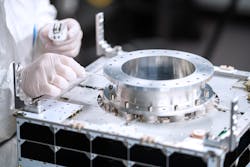First NanoAvionics modular microsatellite MP42 among others launched with Falcon 9
VILNIUS, Lithuania - NanoAvionics in Lithuania has announced that 1 April's SpaceX Transporter-4 mission included three satellites built by the company for multiple customers. MP42 is NanoAvionics’ largest satellite built and launched so far, and is based on one of the first commercially available modular microsatellite buses in the industry.
MP42 is a rideshare mission, and part of the company’s ongoing program. It’s hosting multiple payloads including OQ Technology’s “Tiger-3”, adding another satellite to its 5G IoT/M2M (machine-to-machine) communication constellation, and VeoWare’s RW500 fully integrated reaction wheel.
The two other satellites, launched with SpaceX Falcon-9 launch vehicle are dedicated telecommunications and Earth Observation missions flying onboard NanoAvionics flagship M12P and M6P nanosatellite buses.
Also going into orbit was another of Lacuna Space’s IoT (Internet of Things) gateways. The British-Dutch company, headquartered in Harwell, UK, is creating a network to connect low-cost and low power IoT devices globally. Using LoRaWAN, the Lacuna Network extends connectivity to even the most remote areas of the world where conventional connectivity is not commercially viable.
With the launch of its MP42, NanoAvionics notes that it is an addition to the company’s end-to-end smallsat mission infrastructure aimed at constellations, while also covering mission design, production, launch brokering, ground segment and satellite operations.
By repeating the successful and cost-efficient approach, which the company accomplished with its nanosatellite bus design, manufacturing and integration, NanoAvionics expects to provide similar cost savings with its microsats.
The MP42 mission also marks the finale of NanoAvionics’ GIoT (Global Internet of Things) R&D project, to provide constellation-as-a-service in a business-to-business setup to existing and emerging IoT/M2M operators. The company established the project together with its consortium partners KSAT and Antwerp Space after being awarded dedicated funding by the European Commission's Horizon 2020, ESA's ARTES and private investments. The satellite hosts some enabling technologies developed throughout the length of the GIoT project, including an inter-satellite link and next-generation payload controller.
